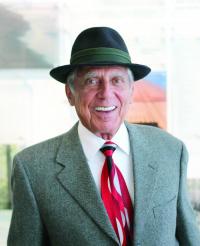
If you’ve ever attended a SPUR party, walking tour or forum, you’ve probably seen Gary E. Malazian, Ph.D. A dead ringer for Pablo Picasso, this dapper SPUR member has lived more than nine lives: trained as plant physiologist, he’s worked as a developer, designer, landscape architect and artist. These days, the self-described “time philanthropist” can be found, as he explains, “luxuriating in the midst of organizations seeking to benefit mankind through chronically looking forward, enabling the citizenry to be all they can be. Regular attendance at SPUR, the Commonwealth Club, the Sierra Club and the San Francisco Museum and Historical Society, all within walking distance, has allowed me to get and stay up to speed in this, the most progressive, freedom-loving community I have ever visited and ultimately lived in.”
We caught up with Gary at the SPUR Member Party in June and couldn’t resist learning more about this most dedicated member of our organization.
How did you first become interested in urbanism?
In the course of completing my doctorate in plant physiology at UC Davis in 1965, I took a class in ecology, only to learn the vagaries of air pollution due to the internal combustion engine, which led to my concern about city planning and the role of America in “innocently” perpetrating planetary demise. America specializes in turning luxuries into necessities. The automobile as a major means of transportation outlived its usefulness long ago, and yet we persist. Thanks to organizations like SPUR, our polluting ways are being addressed.
My official indoctrination into civic participation began with my purchasing a lot on the Balboa Peninsula in 1976 and constructing a mixed-use edifice. During that project, I was invited to join the Balboa Merchants and Owners Association. Eventually I was elected president, and a local business improvement district was formed. That stint led to my participation on the Economic Development Committee for the City of Newport Beach. Because there were inadequate funds to keep Newport Beach evolving to its potential, I suggested that the city fathers divide the community into five villages. The neediest would get the bulk of the redevelopment funds for five years; subsequent villages would then follow suit and the cycle would repeat itself every twenty years. The idea was successful!
But you weren’t ready to give up on plants just yet…
While completing a small condominium project in Costa Mesa, I became heavily involved in plant selection. After taking several courses in trees, shrubs and groundcovers, I developed a software program with a 3,500+ plant database, complemented by an inventory of some 200+ nurseries across the State of California. Eventually, I turned my plant selection hobby into a business, the thrust of which was to select plants to fit their space, thereby eliminating the need for chronic removal of green waste. (30 percent of our landfills are comprised of green waste cut from poorly designed landscapes, and that produces tons of methane gas during decomposition.)
While getting myself up to speed in landscape design and installation, I became intrigued by classes in the art department at Orange Coast College. Several art classes later, I’d completed more than 35 oil paintings and was on my way to becoming a competent artist.
A true Renaissance man. You’ve lived and travelled all over but it seems like San Francisco may be your favorite city, no?
Of all the cities I might have chosen to live in I was blessed to find San Francisco and hope to play some role in its continual evolution. It is a paradise come true. I hope this interview will attest to the freedom, beauty and high-mindedness that describe the city, its culture, its citizens and my appreciation of it. Since I have spent the bulk of my life in suburbia, moving here was the culmination of a dream to live without an automobile, thereby drastically reducing my carbon footprint as much as practicable.
Wise leadership will allow for the redirecting of our efforts by acknowledging our polluting ways and taking on the progressive tack of un-polluting our country and concurrently setting an example for all nations. Moving to San Francisco and joining SPUR has allowed me to participate in that responsible venture, one citizen at a time, with an exemplary, lowcarbon footprint lifestyle. Living amongst souls on a similar bent is reassuring.
